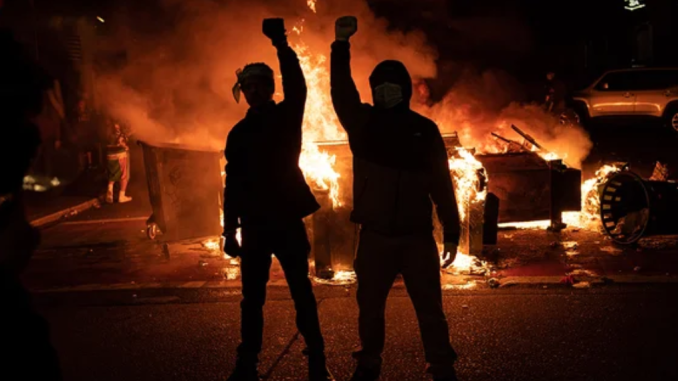
The streets of Seattle are filled with drug needles, homeless tents, and violent political agitators. What used to be a city known for its Space Needle and Nirvana has now become one of a series of case studies for the consequences of leftist rule over America’s cities.
Jason Rantz, a Seattle-area radio host, has seen firsthand the horrific impact the radical left has had on his city.
“It looks like a hellscape at this point,” Rantz says. “You have tent cities everywhere. You have used needles on the ground. You have human waste on the ground … . The Pacific Northwest in general is known as being just beautiful. Really, supposedly, we respect nature. Not anymore, not with how bad it’s gotten. You’ve got graffiti all over the place, which just doesn’t feel good to live in that kind of area anymore.”
Rantz joins “The Daily Signal Podcast” to share his experiences of living in Seattle.
We also talk with Rep. Jim Jordan, R-Ohio, about his concerns about Congress’ select committee on the Jan. 6 riot and what it is doing. You can read a write-up of that conversation here.
We also cover these stories:
Ukrainian President Volodymyr Zelenskyy formally requests European Union membership for Ukraine.
Former President Donald Trump answers the question of whether he would have behaved similarly to Zelenskyy were he in charge of Ukraine.
President Joe Biden’s State of the Union address is set for Tuesday night.
You can listen to the podcast below or read a lightly edited transcript:
Doug Blair: My guest today is Jason Rantz, host of “The Jason Rantz Show” on KTTH in Seattle, Washington. He is also a contributor to The Daily Signal. Jason, welcome to the show.
Jason Rantz: Thank you for having me.
Blair: It is always a pleasure to have a fellow Pacific Northwesterner on the program. Great to talk about it. I wish we could talk about more positive things, but unfortunately, the West Coast has gotten a lot of negative press recently. I’m curious, is that deserved or is this just an optics problem?
Rantz: It’s more than deserved. I would argue it doesn’t get enough of the negative press that it actually deserves, because if you want to enact some kind of change, you actually have to pay attention to the problem.
And it kind of feels like, especially in the Pacific Northwest, you’re not really getting honest coverage about what’s happening on the ground. We’ll get it nationally on Fox. I’m on Fox talking about Pacific Northwest issues all the time. But beyond that, we kind of pretend that, “Oh no, it’s the Emerald City of Seattle. It’s the rose … .” Like, no, it’s not. You should actually go into downtown Portland, downtown Seattle, go into parts of Spokane, things are bad.
Blair: Right, right. Now, what does the city actually physically look like these days? For our listeners who maybe have never been to Seattle or Portland, what does it look like?
Rantz: Well, it looks like a hellscape at this point. I mean, let’s just be clear. You have tent cities everywhere. You have used needles on the ground. You have human waste on the ground. These are two areas—and the Pacific Northwest in general is known as being just beautiful.
Really, supposedly, we respect nature. Not anymore, not with how bad it’s gotten. You’ve got graffiti all over the place, which just doesn’t feel good to live in that kind of area anymore. And unfortunately, things seem to be getting worse before they’re getting better. There’s some hope, but we’ll see.
Blair: Yeah. Now, you mentioned that Seattle and Portland and the Pacific Northwest in general, it’s beautiful areas, the mountains and the trees. How did we get to this point? Where did we see this decline start?
Rantz: Well, I mean, it started decades ago. A lot of the problems are here because of the institutions that have been forever changed.
Nationally, I think we are going to see some progress, because let’s be clear, part of the reason why we’re seeing this prediction of a red wave is because of all of these issues. So if Republicans, who hopefully we take control, if they stick to what they say they’re going to do, then we will start to see some shifts rather quickly nationally.
It’s the regional stuff that you’re probably not going to see that big of a shift. But look, you can’t be that much of an outlier as a major city, so you’re going to have to catch up a little bit because you don’t want to be known as that city. Not anymore.
Blair: Right, right. That was Jason Rantz, host of “The Jason Rantz Show” on KTTH in Seattle, Washington, and a contributor to The Daily Signal. Jason, appreciate your time.
Rantz: Thanks for having me.
* story by The Daily Signal